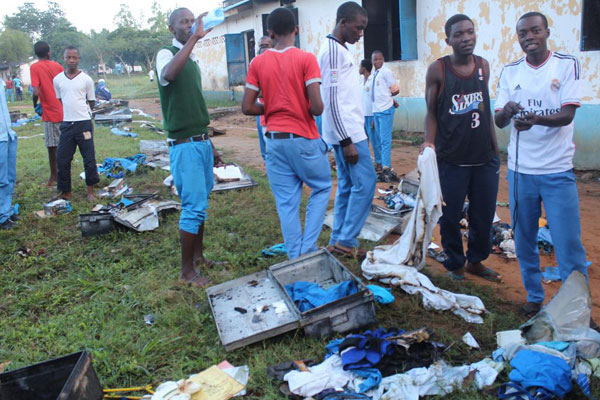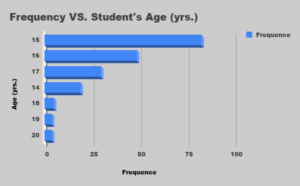
By Mose Mogeni
Parents who do not have enough time to bond with their children could be the cause of the recent school’s unrest, family experts have warned.
Cases of Student unrest in many Secondary Schools in Kenya have been on the increase since 2013 with reports linking these strikes to exam fever. However, our research reveals between July 1st and July 11th of 2018 alone, more than 26 Secondary Schools in the Western part of Kenya have been closed following the unrest. With at least a total of 4,210 students said to be at home and about 47 of them under arrest.
Recently, Regional Police Commander Mr. Lewnard Katana said, that out of the 26 Schools so far, 13 of them are related to an arson attack and they are treating the suspects involved as criminals.
“We are yet to take all of them to court because interrogations are still ongoing, but we can confirm that we are working on the cases to have all suspected criminal punished. We have also asked the school administrations to furnish us with reports on the estimated cost of damage to help us complete prosecution”.
Who is involved?
Investigations on adolescent behavior reveal that between 2015 and 2017, when Student unrest was at its highest levels, indicate that students aged 15 and 16 years old accounted for approximately 68% of those who are directly involved in the School’s unrests as indicated by the raw data provided.
These are students who are in their teenage stage, very responsive, daring and inquisitive with low academic pressure compared to those in their fourth form. These teenagers badly need their parents to provide emotional presence, and not just paying school fees or buying school uniform as evidenced in a number of schools in Machakos County during the study.

“ My husband and I normally leave the house early in the morning and get back at 7 or 8 pm in the evening, every day Monday to Saturday as we run a business in town. Most of the time our two sons who are day scholars in a nearby secondary school are under the care of our very able househelp.” Says Mary Nduku, one of the parents we interviewed.
A Google search engine for the word ‘house helps’ yields over 804 million results. Striking enough is that the first results of are about Kenyan locations such as Kawangware, and the agents that provide house helps (nannies) to various families. Use of relatives from upcountry as house-helps is the common solution for working couples who employ them to take care of their children and carry out domestic chores.
Lack of parental emotion
According to a study published in 2015 , one in every two students aged between 15 and 16 years old in both private and public schools, acknowledged that they spend more time with their house help at home than their parents.
With the current economic demands in major cities and towns across the country and the wold at large, the growing middle-class parents have been forced to leave their children with the house helps.
“Our house-help is like my mother, she does everything for me because my parents have very busy schedules at work .They leave very early in the morning and come back at home very late ,” says Magdalene Ndunge from Machakos County. This increasing phenomenon is raising concerns as 55% of student interviewees strongly agreed that they spend a lot of time with their house-helps while at home.
Timinah Awinja, a house help in one of the suburbs in Nairobi confirms to this writer how it is difficult for her to take up some of the parenting roles such as shaping moral values. ”My employer has completely left everything in the house to me including staying with the children when they are very busy working, they come very late and wake up so early “.
This then begs the question, do house-helps posses the Core Values of parenting now that most of our children are spending a lot of time with them?
In most cases, couples think that any house help, with a few instructions, can manage the home and take care of the children. Indeed a considerable number of house-helps do their jobs well; yet, the majority may do the chores well but neglect the child nurturing which has proved to have a negative effect on the growth the child in future due to the mistreatment as shown by this video.
“Having a house help is by choice. It is not prohibited, but how to draw the line between their role and those duties and responsibilities of a child as entrenched in the Children Act, is what constitutes diligent parenting,” says Dr. Rose Atieno, a Consulting Psychologist at Masinde Muliro University of Science and Technology (MMUST) in Western Kenya.
Some of the recent indiscipline cases witnessed in secondary schools, ranging from school absconding, name calling and assaulting of teachers by students as reported recently in a daily paper. Fighting and theft to serious cases of misbehavior such as riots in and outside the school compounds, drug abuse, sexual immorality, rape, bullying of other students especially newcomers, burning of schools and even murder of fellow students.
For instance, in 2008 at Upper Hill secondary school in Nairobi- Kenya, a deputy school captain perished while trying to save his fellow students from a burning dormitory that was believed to have been set on fire by the students.
Recent reports also indicate that the change of school rules which saw thousands of school head teachers transferred across the country is also to blame contrary to what the ministry of education says.
“Nowadays we have to wake up early at 4 pm and end lessons at 10 pm, without a break and with so many endless exams,” said one of the students.

The data from the study published in 2015 indicate that there is a strong correlation between the indiscipline being witnessed in secondary schools where teenagers are many, and lack of parental emotion at home.
Speaking to Talk Africa, Dr. Rose Atieno notes, “This is a missed perfect opportunity for parents to emotionally connect with their children, communicate their expectations, understand their children’s threats in life, aspirations, and dreams, career aspirations and even their acquaintances. When parents are completely invisible, the void enlarges rebellion, disobedience, attention-seeking behavior, irresponsibility in academic and sexual life. ”
Other factors said to be influencing the ongoing student misbehavior include family separation such as divorce, single parenting, media and technology that is increasing occupying parental space and poor school management systems among others.
What Next?
To curb these unrests, on July 9th 2018, the government of Kenya through its Ministry of Education responded by releasing a press statement supporting the move taken by the Directorate of Criminal Investigations (DCI) to criminalise all acts of student unrest, destruction, and arson.
“Students who commit criminal acts will be prosecuted and will have criminal records indicated on their leaving certificates. They will not be able to get scholarships, no admission to our Kenyan universities and jobs will not be forthcoming for anyone with a criminal record ” Says the Education Cabinet Secretary Amina Mohammed.
Dr. Atieno further reveals, “These youngsters are highly depressed and are experiencing a lot of challenges from a poor performance in school, truancy, tardiness to withdrawal from school activities due to peer pressure leading to agitation problems and suicidal thoughts. “
She, therefore, advises, teachers and parents, to work hand in hand with students to stamp out such ills in our educational institutions. “We should be more worried about what we do and how we behave in front of our children than what we say as they listen”.
For feedback email : mose.mogeni@gmail.com













